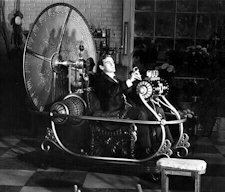Frequently asked questions
Question - I am 14 years old and really interested in time travel but have found your site a little difficult to understand. Please can you explain some of the fundamental concepts in a little more detail for somebody of my age?
Answer - Time has fascinated people throughout our history, we have constantly come up with every increasingly more complex and accurate ways to measure the passing of this thing which we call time. However, I wonder how many people realise that time itself is not exactly the same wherever you are. Albert Einstein was the first to show in his Theory of Relativity that time was not, in fact, a smooth river, constant in its flow, but something that could be affected by motion and by gravity - an effect known as time dilation. Einstein did not consider time and the three spatial dimensions as being separate, but as being linked to form a four-dimensional quantity known as space-time. Einstein's theories of relativity have been proved by numerous experiments, including one in 1971 in which highly accurate atomic clocks were placed aboard two high-speed aircraft, with another one at an airbase. Despite staying in the same location, the ground clock was not stationary, since it was travelling at the same rate as the Earth spins. One aircraft flew eastwards from the base, travelling in the rotational direction of the earth and so moving faster than the ground clock, while the other flew westwards and so moved relatively slower. After the flight, the eastbound aircraft's clock had lost time relative to a ground-based atomic clock, while the opposite was true of the westbound aircraft's timepiece. Amazing eh? The only constant in the theory of Special Relativity is that the relative speed between any observer – regardless of their own motion and any ray of light is always 300,000 kilometres per second (186,000 miles per second). The consequence of this theory, once the equation has been balanced, is that not only is time different for a faster observer, but also lengths and mass change. In 1915, Einstein developed his ideas to form the General Theory of Relativity, in which he considered objects that were being accelerated with respect to one another. He compared the forces of acceleration and gravity and found them to be indistinguishable. For example, an astronaut standing in a rocket on a launch pad would feel himself pressed against the floor because of gravity. If the same rocket was in outer space and not affected by gravity, but with its engines turned on so that it was accelerating, the astronaut would again be pressed against the floor. If the acceleration due to the engines were the same as the acceleration due to gravity, the astronaut would have no way of telling whether the rocket was at rest on the earth or accelerating in outer space unless the looked out of the window. Einstein stated that the attraction to the Earth of a rocket that is resting on a launch pad is equivalent to the acceleration of the rocket. So although in three-dimensional space, the rocket remains stationary, in four-dimensional space-time the rocket is in motion along its world line. The upshot of this motion in space-time is that gravity also makes time run slower. This notion becomes more relevant when considering the greatest gravitational fields known: those within a black hole. A black hole is a dying star that has collapsed under the weight of its own spent fuel, with the result that its gravity field is so strong, not even light can escape its pull. The edge of a black hole is called an event horizon, since that is where light cannot escape. Compared to such forces, the Earth's escape velocity is paltry in comparison. A spacecraft needs a mere 11.2 kilometres per second to break free of our planet's grip. As the edge of a black hole - known as the event horizon - is neared, time slows down relative to areas, which are distant from the hole. Some scientists believe that within the event horizon, all matter collapses into a dimensionless object of infinite density known as a singularity. However, others argue that no such collapse occurs and that space-time forms a closed surface without a boundary. In effect a black hole would then not be a rip in space-time, but would be more like the hole of a doughnut. This second theory opens the possibility of using black holes to link to other parts of the universe through tunnels in space-time known as wormholes. By entering one end of a wormhole a traveller might be able to take a short cut through space-time to another part of the universe. In a similar way, the shortest route between one side of a donut to the other is through the hole in the centre, rather than around the rim. Einstein's General relativity equations do not rule out the possibility that these wormholes might not only provide a tunnel through space, but also a tunnel through time.In principle, Einstein's General Theory of Relativity allows the possibility that a practical time machine might be built. Such a machine would need to be able to create and manipulate black holes, and the technology needed for it is far more advanced than anything humanity might devise for hundreds or even thousands of years.We believe from a personal viewpoint that time is not simply linear - flowing in one direction but cyclic. Eastern concepts about the universe have often interpreted it as a series of cycles of birth and death. By analysing some complex equations, we believe that the universe runs in cycles, with time running backwards as well as forwards. In other words, we will all live again and again.
![]()
Question - How do I build a Flux Capacitor?
Answer -We assume you are referring to the film “Back to the Future”. Unfortunately we get used to receiving e-mails like this and it deeply saddens us. You see, the world’s scientists are working really hard to push our knowledge forward but it seems that every step forward that the scientific community make Hollywood pushes us back two steps. The aim of our website is to try and separate fact from fiction, such as "Back to the Future".
![]()
Question - Time doesn’t exist. It is man made and totally artificial. Do you agree?
Answer - No. Are you saying that before man evolved there was no time? I agree that the measurement of time is man-made, but as for the actual existence of time, that is undeniable.
![]()
Question - I built a time machine in my garage using some magnets and a quartz crystal.
Answer -We have found that after extensive scientific study that the power required is a little greater than can be achieved with a magnet and/or a crystal. There is some truth in the statement that a crystal has some lattice energy but it is only very small indeed and not enough to light a candle let alone propel a machine and its user at trans-light velocities. Seriously we have received a surprisingly large number of e-mails on this subject, including a guy from the USA who was positive that by taping a magnet to his head he was able to see the future. We were in regular contact with this individual until we received an e-mail from him saying that he needed more power and was going to wire his copper head magnets to the main electricity supply. We never heard from him again, either his experiment worked or, as we suspect, he didn ’t achieve the results he had hoped for.
![]()
Question - If I could go back in time and shoot my grandmother surely I would then never have been born so I couldn’t then shoot my grandmother.
Answer -This paradox is discussed in detail in the website and so we must assume that you were unable to follow the argument contained therein and require a more basic explanation. The truthful answer to this is that nobody knows the right answer. Professor Hawking from the University of Cambridge in the UK prefers the idea of a “Cosmic Censor”, i.e. something will always happen that stops you from changing history, e.g. the gun will misfire etc. Other ideas are that you can kill your grandmother and by doing so you generate a new universe where you are not born. Finally, there is another school of thought that suggests there are an infinite number of universes and so everything that is possible has already happened.
![]()
Question - Are there any countries which are developing time machines?
Answer - What is being worked on in area 51? On a serious note, in a way yes, but not in the way that you think. There are several countries looking at accelerating particles to high velocities and smashing them together to create all sorts of exotic matter. In these experiments the high velocities result in significant time dilation effects, which can be observed and measured.
![]()
Question - I have enjoyed your website and have found it most informative. I would like to investigate the topic further, what do you suggest I do?
Answer - Thank you for your kind e-mail. We would recommend that you have a look at the recommended books and videos.
![]()
Question - I regularly have dreams where I visit ancient Egypt and watch the building of the pyramids. Is this time travel?
Answer -No, this is dreaming. The human mind is an amazingly complex entity and is able to produce many experiences which could be interpreted incorrectly as time travel. We also receive many e-mails from people claiming that after taking LSD and other mind altering drugs they have “Time Travel” experiences – draw your own conclusions.
![]()
Question - When do you think man will have a fully functional time machine like the TARDIS?
Answer -It will be a very long time before technology is available to build a time machine. We guess that you’re looking at hundreds probably thousands of years if at all. We think it much more likely that man will not survive long enough to develop the technology, being killed off either by bacteria and viruses (our only true predator) and annihilation by war.
![]()
Question - Where does God fit into this?
Answer - That's a simple question to answer, it doesn't. If you're interested in finding out more abut this, I strongly recommend the book below:
THE GOD DELUSIONThis book is a hard-hitting, impassioned rebuttal of religion of all types. In America, and elsewhere, a vigorous dispute between 'intelligent design' and Darwinism is seriously undermining and restricting the teaching of science. In many countries religious dogma from medieval times still serves to abuse basic human rights. And all from a belief in a God whose existence lacks evidence of any kind. This is required reading for anyone interested in this most emotional and important subject. |









